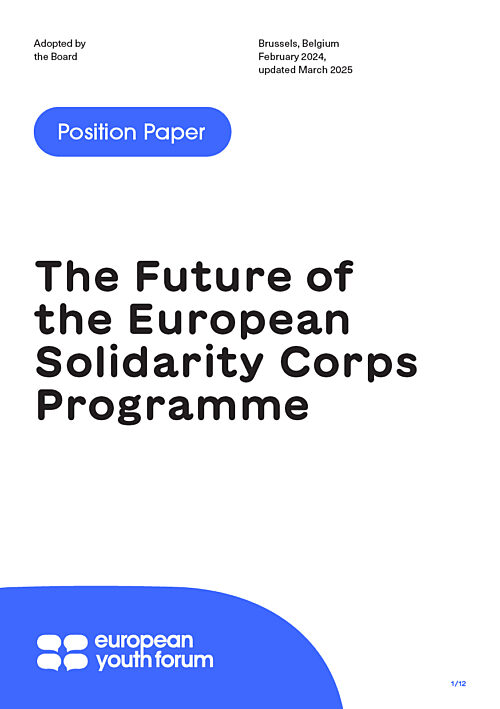The future of the European Solidarity Corps Programme
As one of the main EU youth programmes, the European Solidarity Corps has brought numerous benefits to young people and the youth sector in general all across Europe. It offers opportunities to young people in terms of personal and educational development precisely in the period of their lives in which they transition into becoming fully independent from their caretakers. This position paper identifies the areas for improvement for the programme as well as the elements that are working adequately and should be continued, particularly in the framework of its current evaluation.
Some of our key demands include:
- Triple the overall budget envelope for the European Solidarity Corps successor programme.
- Accommodate the annual budget envelope for the rising inflation and be indexed accordingly.
- Maintain the ESC as a standalone programme separate from Erasmus+ .
- Include youth work and youth organisations as an additional horizontal priority in the upcoming ESC successor programme .
- Lower the age limit to take part in solidarity activities to 16, both for in-country and international placements.
- Renew investments to ensure that the ESC programme reaches out to as many young people with fewer opportunities as possible as set in its goals, while improving data gathering and monitoring.
- Reassess the various IT tools to ensure their continuous glitches are fixed and their user-friendliness is improved.
- Increase communication, outreach and capacity building activities of both the European Commission and Erasmus+ National Agencies, targeted both towards potential participants and specifically for youth organisations to engage as sending or hosting organisations.
- Establish the “EU Volunteer Status” legally recognised across all countries participating in the ESC, to facilitate cross-border solidarity and the mobility of young volunteers.
- Reform and improve the governance and flow of information within the ESC programme by including the European Youth Forum as an observer in the ESC Programming Committee meetings, and National Youth Councils in advisory bodies of their respective Erasmus+ National Agencies.
* The original Position Paper was published in February 2024. The current revised version was approved by the board of the European Youth Forum in March 2025.
Would you like to know more? Get in touch!

Related publications

Ensuring good governance and youth participation in the management of Erasmus+ National Agencies
Erasmus+ National Agencies are vital for developing the EU youth sector and ensuring equal access to opportunities. However, youth organisations report issues with transparency, communication, and consultation. Strengthening transparency, accountability and stakeholder participation is essential.

Assuring Peace and Justice in Palestine and Israel
The European Youth Forum urges Council of Europe states to uphold the Genocide Convention, act to prevent atrocities, and ensure accountability under international law. Read the motion to find out more.

Mainstreaming Young People in the Next Multiannual Financial Framework 2028-34
To support young people comprehensively, the EU must extend focus beyond Erasmus+ and ensure broader policies benefit young people and youth organisations. A youth-focused policy for future programmes, accessible architecture, and youth engagement in shaping the next MFF are essential.
